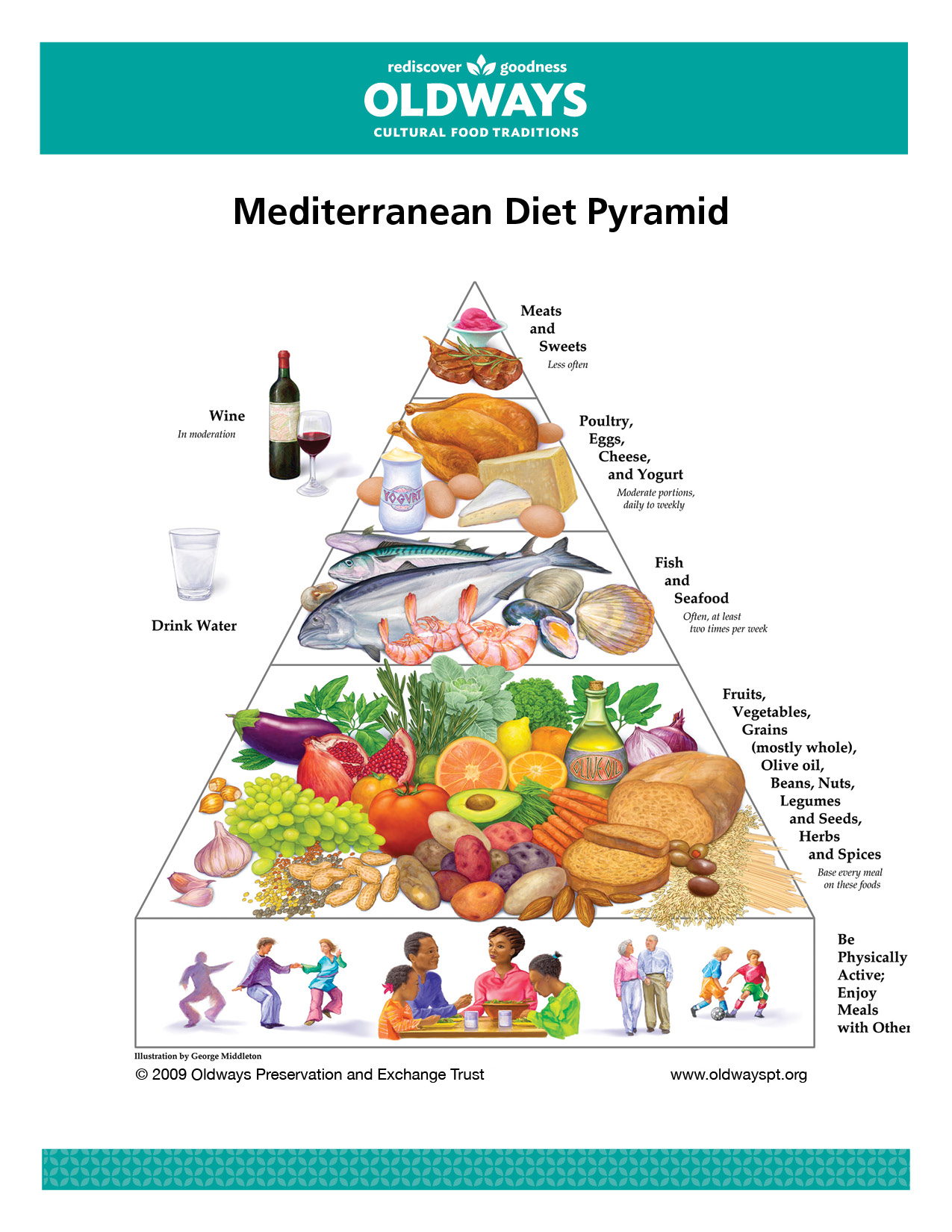What Is It?
The Mediterranean die(MedDiet) is more than a way of eating; it’s a lifestyle rooted in the traditions of Mediterranean countries. This dietary pattern has gained global attention for its numerous health benefits and is often hailed as one of the healthiest diets in the world, especially for mature women.
Health Benefits of the Mediterranean Diet for Women in Midlife
Reduced Risk of Cardiovascular Diseases

One major advantage is reducing cardiovascular disease risk. For midlife women, heart health is crucial. This diet is rich in heart-healthy foods like fruits, vegetables, whole grains, and olive oil, which lower bad cholesterol, reduce inflammation, and boost heart health.
In a study of 3,562 adults with heart disease, those following a Mediterranean diet were 20% less likely to die from all causes and 22% less likely to have a cardiovascular event over 7 years. This diet is also linked with slower disease progression and better survival in prostate cancer and a lower risk of breast cancer relapse.
Effective Weight Management
The Mediterranean diet supports sustainable weight management, a crucial factor for women in midlife as metabolism slows down. Its focus on nutrient-dense foods and balanced portions helps maintain a healthy weight over the long term. This diet encourages the consumption of wholesome foods that keep you full and satisfied, reducing the likelihood of overeating.
Enhanced Cognitive Function
Research indicates that the Mediterranean diet can protect against cognitive decline and reduce the risk of neurodegenerative diseases like Alzheimer’s. For women in midlife, cognitive health is paramount. The inclusion of omega-3 fatty acids from fish, antioxidants from fruits and vegetables, and healthy fats from olive oil nourishes the brain and supports cognitive health.
Lower Incidence of Chronic Diseases
Adopting the Mediterranean diet lowers risks of type 2 diabetes, hypertension, and metabolic syndrome. Emphasizing whole foods and reducing processed foods and sugars enhances health and longevity, crucial for midlife women.
Cancer Prevention
Several studies suggest that the Mediterranean diet may reduce the risk of certain cancers, including breast cancer, which is a significant concern for women in midlife. The diet’s high intake of fruits, vegetables, and healthy fats, along with moderate consumption of red wine, provides antioxidants and anti-inflammatory properties that help protect against cancer.
Key Components of the Mediterranean Diet
Plant-Based Foods
The Mediterranean diet places a strong emphasis on plant-based foods. Fruits, vegetables, legumes, nuts, seeds, and whole grains are staples. These foods are rich in essential vitamins, minerals, fiber, and antioxidants, promoting overall health and preventing chronic diseases.
Healthy Fats
Healthy fats are a cornerstone of the Mediterranean diet. Olive oil is the primary source of fat, renowned for its high content of monounsaturated fatty acids that support heart health. Avocados, nuts, and seeds also contribute beneficial fats, enhancing the diet’s health benefits.
Lean Proteins
Fish and seafood are the primary sources of protein in the Mediterranean diet. These foods are rich in omega-3 fatty acids, which have anti-inflammatory properties and support cardiovascular health. Poultry, eggs, and dairy products are also included but in moderate amounts, ensuring a balanced intake of protein.
Limited Red Meat and Processed Foods
The Mediterranean diet limits the consumption of red meat and processed foods. These items are high in saturated fats, sodium, and preservatives, which can be detrimental to health. Instead, the focus is on lean proteins and minimally processed ingredients that support a healthy lifestyle.
Moderate Red Wine Consumption
Moderate consumption of red wine, particularly with meals, is a characteristic feature of the Mediterranean diet. Red wine contains antioxidants such as resveratrol, which may offer cardiovascular benefits when consumed in moderation.
Adopting the Mediterranean Diet
Gradual Transition and Flexibility
Transitioning to the Mediterranean diet doesn’t have to happen overnight. Start by making small changes to your eating habits and gradually incorporate more Mediterranean-inspired meals into your routine. Flexibility is key, and indulging in your favorite foods occasionally is okay.
Exploring Mediterranean Recipes
Explore traditional Mediterranean recipes and experiment with new ingredients and flavors. Use fresh herbs, spices, and citrus fruits to add depth and complexity to your meals. Enjoy the process of discovering new dishes inspired by Mediterranean cuisine.
Increasing Vegetable and Whole Grain Intake
Focus on filling your plate with a variety of colorful fruits and vegetables, whole grains, legumes, and nuts. These nutrient-dense foods provide essential vitamins, minerals, fiber, and antioxidants that support overall health and well-being.
Enjoying Meals with Loved Ones
The Mediterranean diet is not just about what you eat but also how you eat. Embrace the social aspect of mealtime by enjoying meals with family and friends. Share delicious, wholesome food in a relaxed and convivial atmosphere, savoring each bite and appreciating the company of loved ones.
Common Misconceptions About the Mediterranean Diet
It’s Expensive and Inaccessible
Contrary to popular belief, the Mediterranean diet can be affordable and accessible to people of all income levels. Many staple ingredients, such as beans, lentils, whole grains, and seasonal produce, are budget-friendly and widely available.
It’s Too Restrictive or Difficult to Follow
While the Mediterranean diet emphasizes certain foods over others, it is not overly restrictive or prescriptive. There is room for flexibility and adaptation based on personal preferences, cultural traditions, and individual dietary needs.
All Mediterranean Foods Are Healthy
While the Mediterranean diet promotes a pattern of eating that is largely healthy and nutritious, not all Mediterranean foods are created equal. It’s important to choose minimally processed, whole foods whenever possible and be mindful of portion sizes and cooking methods.
Conclusion
No matter your age—whether you’re in your 20s, 40s, 50s, 60s, or beyond—it’s never too late to embrace the Mediterranean lifestyle. Take charge of your well-being by diving into the flavorful and nutritious Mediterranean diet. You can start by exploring a new recipe, traveling to a Mediterranean region, or simply making conscious choices to incorporate more Mediterranean foods into your meals.
The Mediterranean diet is about savoring the journey of Healthy Aging, not just reaching the destination.